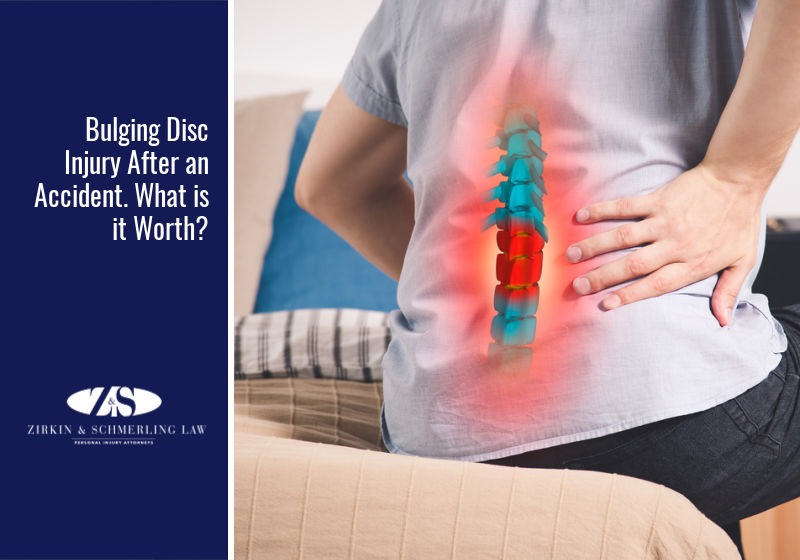
Victims of car accidents in Maryland can experience numerous types of serious and permanently debilitating injuries. Tragically, around 50,000 people suffer from personal injuries from car accidents every year in Maryland alone, and around 30% of all Maryland wrecks result in injuries to drivers and passengers.
One common type of injury people experience in wrecks is bulging disc injuries. Although these injuries usually don’t require extensive medical treatment, they can lead to serious complications when left untreated.
If you suffered from a bulging disc injury or another affliction that resulted from another driver’s negligence, you need to hold them financially accountable for damages. When you’re able to prove that another party was at fault for your accident and that the wreck directly caused your injuries, you can recover compensation for medical bills, lost wages, pain and suffering, and more.
Here’s what you need to know about bulging disc injuries and recovering the compensation you deserve.
What is a Bulging Disc Injury?
When people talk about bulging disc injuries, they’re referring to the discs in between each spine bone in the spinal column. Your spinal column is made up of 33 bones that extend from your neck to your lower back. The discs in your vertebrae keep the spinal bones from rubbing against one another. Each disc contains an annulus fibrosus — the outer ring of the disc — and a gel-filled center that’s called the nucleus pulposus.
Your discs play a vital role in your spine and bodily health because they absorb shock and enable your spine to move.
Many people confuse bulging disc injuries with herniated disc injuries. A herniated disc — also known as a “slipped disc” or a “ruptured disc” — refers to an injury in which the annulus becomes torn or ruptured and part of the nucleus pulposus is pushed out of the outer layer of the disc. Sometimes when this injury occurs, the gel within the nucleus pulposus leaks out inside of the disc.
A bulging disc, on the other hand, refers to the outer layer of the intervertebral disc becoming misshapen and deformed. This can happen naturally as a person ages, and a physically traumatic event, such as a car accident, can also cause a disc to bulge.
Although medical professionals classify herniated discs as a more serious injury than bulging discs, bulging discs are more likely to cause nerve root impingements, which can be incredibly painful and lead to further complications.
Bulging Disc Complications
Even though bulging discs often have painful symptoms, people can live for years with this affliction without realizing it. Often, people can develop worsening symptoms as their condition is left untreated. Some common complications that will likely worsen with time include:
- Permanent Nerve Damage: When a bulging disc compresses your body’s nerves, it can cause permanent damage over time, which may result in weakness, chronic pain, and numbness. Eventually, when left untreated, the nerve impingement can lead to serious conditions, such as saddle anesthesia, cauda equina syndrome, and dysfunction in your bowels and bladder.
- Herniation: A bulging disc can eventually become herniated when left untreated. As the disc protrudes, it will begin to degenerate from daily activities, eventually leading to a disc rupture.
- Back and Leg Pain: When lower back nerves become compressed from a bulging disc, sciatic pain may occur, which can impede one’s ability to exercise and even perform daily activities.
If you suspect that you’ve suffered from a bulging disc injury, you need to seek immediate medical treatment to avoid future complications that may have permanent repercussions.
Treatment of a Bulging Disc
Fortunately, most bulging disc injuries do not require surgery. Over 90% of cases are treated through:
- Avoiding activities that exacerbate the bulging disc pain
- Anti-inflammatory medication
- Ice and heat therapy
- Cortisone injections
- Physical therapy
If the bulging disc injury is more severe and causes issues like numbness, debilitating pain, and problems with your bladder or bowels, medical professionals may suggest minimally invasive spinal surgery.
This procedure removes the part of the disc that’s bulging into the spine and compressing the nerves. These surgeries are considered low risk and only require small incisions.
Average Settlement for Bulging Discs
The amount of money you can expect to receive for a bulging disc injury depends entirely on the severity of your case. For example, if you require surgery, you’ll likely end up owing a lot more in medical bills than if you only receive treatment via anti-inflammatory medications and cortisone injections. Your settlement or the money you win in court will reflect the amount of money that you had to pay to address your injuries.
Additionally, the impact the injury has on your daily life affects the amount of your claim. For example, if your injury forces you to miss work or causes permanent limitations, you’ll likely recover far more in compensation. Your case’s damages directly correlate to the overall severity and impact of your injuries.
On average, victims of bulging disc injuries recover between $15,000 and $30,000 in compensation because these afflictions typically don’t require surgery. The median settlement for a bulging disc is around $31,000.
Contact a Maryland Bulging Disc Personal Injury Lawyer
Although bulging disc injuries frequently don’t result in huge settlements — especially as compared to herniated disc settlements which are $360,000 on average — these cases can result in substantial payouts if the injury seriously impacts your life.
If you suffer from a bulging disc injury after a car accident, you need to seek legal representation in order to recover the most compensation possible. For expert bulging disc personal injury attorneys in Maryland, contact the lawyers at Zirkin & Schmerling Law. We can help you recover the damages you deserve for your bulging disc injury or another personal injury, including medical bills, lost wages, loss of future earnings, pain and suffering, property damage, and more.
Call our Pikesville office today at 410-753-4611, or you can schedule a FREE case consultation here.
